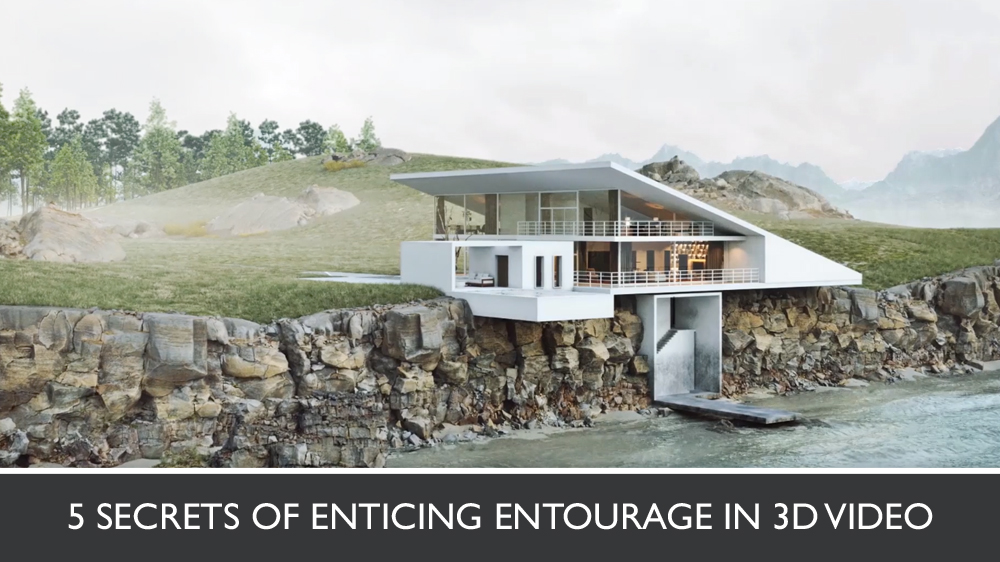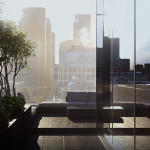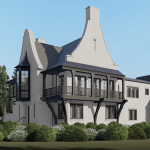Photorealistic 3D animation helps Architects win their client’s approval at projects’ presentations. This tool allows showing the audience how the result of the construction will look. No matter if the works are still in progress or even have not been started yet — a CG video will show the expected outcome in high detail, in photoreal quality, and in motion. So, it’s no wonder that many Architects already make extensive use of 3D animation for presenting designs.
However, Architecture Specialists might be unaware of all the possibilities of photorealistic CGI videos. Which means they do not bear all the fruits from the usage of 3D visualization technology. The Architect may order 3D animation rendering services and get a top-notch digital video showcasing the future house from every angle, precisely showing materials and architectural solutions, and even the surrounding area. It may seem that nothing can serve as a better visual presentation material.
But the truth is that photorealistic 3D animation has more aces up its sleeve! Skilled 3D Artists know how to showcase future property’s surroundings in such a way that it will truly wow the viewers. With such a video, the audience will not just understand how the house will look — they will get the experience of watching an exciting movie with interesting effects. Which will help the viewers connect emotionally with the architecture project and help sway the clients.
So what is that magic we are talking about? Read up and learn 5 secrets from the professional 3D Artists about creating enticing entourage in 3D animation!
#1. Showing All the Times of the Day and Seasons
Photorealistic animation allows viewers seeing the property in all times of the day and in all seasons of the year — within just a few minutes. Professional 3D Artists call this feature “time lapse”.
Using this option, it is possible to create a photorealistic animation displaying a smooth transition from, for example, a sunny summer day to a chilly winter night with a starry sky. This way, the main hero of the animated 3D video, the house, will be shown bathed in the bright sunlight and then covered with the heavy show, with warm exterior lights shining invitingly. This way, the viewers will get a comprehensive understanding of the project and imagine their future life in this place all year round.
#2. Showcasing a Future Property in its Real Surroundings
When hearing about architectural photorealistic 3D animation, most would imagine a video in which everything, from doorbell on the door to the clouds in the sky, is created in virtual space. But the surprising truth is that the surroundings in digital architectural animation can be real!
To get such a 3D movie, an Architect should have a drone video shot above the territory where the house will be constructed. Then, he should send this footage together with the design brief to a CGI studio. With the help of special software, seasoned 3D Animation Artists will create a 3D model of a future building and then combine it with drone footage of existing landscapes. So, as a result, the Architect will get a 3D movie where the property which is not built yet is shown inside the real environment.
#3. Showing Real Actors in a Digital 3D Movie
Oftentimes, the Architect wishes a photorealistic animation to include humans. These can be kids playing in the street, businessmen drinking coffee outside the office center, a person sitting at the balcony enjoying the outside view, and so on. Such scenes liven up the project presentation and give viewers a life-like experience so that they can imagine themselves at this house.
But computer-generated figures of people do not always look as realistic as the Architect wants. So, should he abandon the idea of showing people in a photorealistic 3D animation in this case?
Definitely not. If there is a need to show realistic humans in the 3D animation, the Architect should ask 3D rendering studio to use Chroma Key technology. This tool allows showcasing real actors in a digitally created environment. For this, the 3D Animation Artists find an appropriate Chroma key template — which is a video of a real person or a group of people on a green background. These actors perform different activities such as walking, dancing, etc. Then, the 3D Artist removes the green background and uses the moving figures of people in a photorealistic 3D animation.
#4. Combining Eye-level and Aerial views of the Property
A professional 3D animation studio can create photorealistic 3D videos that show the building from different perspectives. Namely, these can be eye-level views and aerial views. Each of these two options explains different aspects of an architectural project.
Eye-level photorealistic 3D animation allows for examining the house itself: the architectural style and elements, materials that they are made of, facilities in the yard, and so on. As for aerial 3D views, they show the building from high above, thus giving an idea of what is located in the neighborhood, and how well the future dwelling harmonize with its surrounding.
Eye-level and aerial photorealistic 3D animations can be used separately and do the work just fine. However, the combination of eye-level and bird’s view perspectives within one 3D footage gives viewers more information and therefore helps to understand the project to the fullest.
#5. Showing the Surroundings in Separate Scenes
A well-made photorealistic animation shows every detail of the future dwelling: its architecture, materials, indoors and outdoors zoning, and so on. This way, it provides the audience with a clear understanding of the project. But to increase the impact, it is reasonable to add some emotions to the footage, something that would engage and tease the viewer’s imagination. For this, the scenario of a photorealistic 3D animation may include not only scenes showing the house itself but also shots concentrating on landscapes around. It applies to any kind of environment — a city, a village, a forest, a seashore, and so on.
Crops waving in the field, sunbeams shining through thick foliage, calm waters of the lake — such scenes can make the viewer feel like he’s already living in the residence and enjoys its harmony. So in the next second of the 3D animation, when the prospect sees their future house, they will perceive it as a part of this beauty.
Photorealistic 3D animation can transform an architectural presentation. It can show a property in all seasons and times of the day within one footage, as well as combine real videos with digital materials to ensure the most realistic effect. Also, a CG movie can show the future real estate from different perspectives, and highlight the unique beauty of landscapes around it.
Want to get a top-notch 3D video with breathtaking scenery that your clients will fall in love with? Contact our 3D animation company and get high-end 3D footage to sign more deals.





The aerial view looks very cool